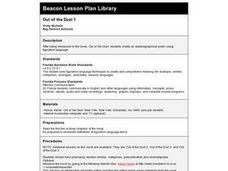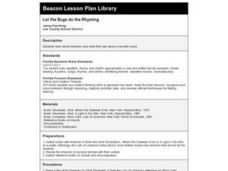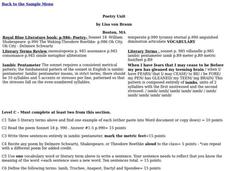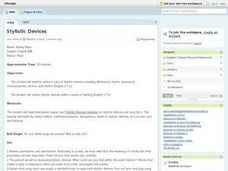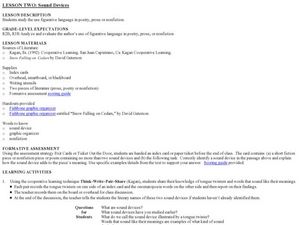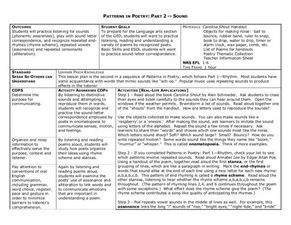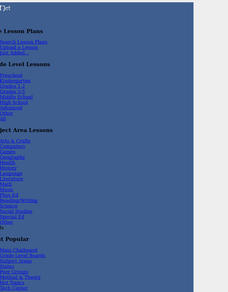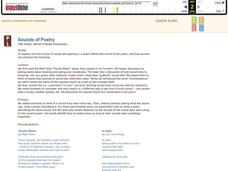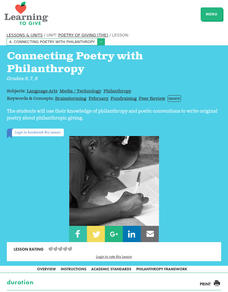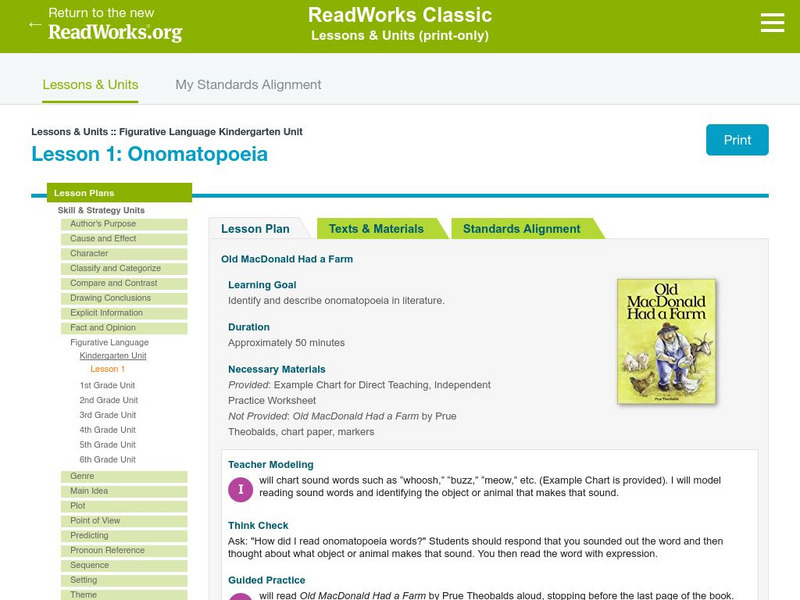Curated OER
Poetry: Serve Warmly and More Often
Young scholars identify the mood and theme associated with the language of poetry. They discuss personal interpretation in small groups, and as a class and * experiment with language and rhythm.
Curated OER
Out of the Dust 1
Young scholars review figurative languages terms and examples. They read the first entry in the book, Out of the Dust, and discuss the images created by the author. Then they create an autobiographical poem using figurative language.
Curated OER
Out of the Dust 4
Eighth graders read the novel, "Out of the Dust," and create a free-verse poem about a treasure of their own. They use the attached checklist to evaluate their own poem.
Curated OER
Let the Bugs do the Rhyming
Students listen to limericks and write their own about a favorite insect.
Curated OER
Mixing Metaphors with Politics
Students discuss different literary devices and use them to write summaries of New York Times articles dealing with international news. They reflect on the effectiveness and appropriateness of sports metaphors in the political arena.
Curated OER
The Highwayman
Fifth graders re-read the story "The Highwayman" understanding the term "narrative verse". As a paired activity, they predict who or what might be the audience and provide feedback.
Curated OER
Poetry Unit
High schoolers, after examining three forms of poetry, review and document a variety of literary terms. Vocabulary words are enveloped into the literary terms as well and are cited from each selection by each student.
Curated OER
Stylistic Devices
Students review connotation and denotation and stylistic devices in poetry. They read the lyrics to a song as it is being played and then discuss the meaning of the song. As a class, students read poems, share their thoughts, and...
Curated OER
From Ordinary To Extraordinary Writing
High schoolers investigate the quality of writing while focusing on the use of sensory words to convey meaning and ideas. The power of similes and metaphors is emphasized while they create and edit works of writing. The skill of...
Curated OER
Connecting Poetry with Philanthropy
Learners use their knowledge of philanthropy and poetic conventions to write original poetry about philanthropic giving. In this philanthropy lesson, students write poetry based on philanthropy using poetic conventions. Learners...
Curated OER
Those Cells Look Good Enough to Eat
Pupils explore the parts of the cell. In this cell lesson plan, students use foods to create cell models that represent the nucleus, cytoplasm, cell membrane, mitochondria, ribosomes, vacuoles, endoplasmic reticulum, and Golgi bodies...
Curated OER
Comic Book Project
Young scholars write a fictional story into a comic book format. In this creative writing lesson, students analyze example comics and discuss the format. Young scholars create a comic book using imaginary characters that find a solution...
Curated OER
Sound Devices
Learners examine the impact of sound devices in poetry, prose, and non-fiction. In this figurative language lesson, students read instructor-selected literature and identify uses of alliteration, repetition, consonance, rhythm, rhyme,...
Curated OER
Shiloh Chapters 9 and 10
For this comprehension worksheet, pupils read chapters 9 - 10 of Shiloh and complete multiple choice questions. Students complete 11 questions.
Curated OER
Emotion Similes
Students define what a simile is before writing a poem that is based primarily on similes. They brainstorm and write the poem using the give format. They write drafts, revise and present a final poem.
Curated OER
Patterns in Poetry: Part 2 -- Sound
Learners understand a variety of poems listening for sound letter correspondence, rhyme scheme, assonance, and alliteration. In this language arts lesson, students practice listening and reading skills to complete patterns in...
Curated OER
Georgia Performance Standards Framework for ELA Unit 6-8th grade
Eighth graders explore figurative language through the study of picture books. In this figurative language lesson plan, 8th graders listen to books and chart the figurative language that they hear. Students discuss examples in groups.
Curated OER
Modern American Poetry
Students identify different types of literary terms in poems. They read different poems and create a packet summarizing them. They write a poem of their own and a biography of one of their favorite poets.
Curated OER
Sounds of Poetry
Fifth graders read "Tunnel Music" and then explore how words and spacing in a poem affects how the poem sounds.
Curated OER
Bringing the Line to Life
Students use different types and lengths of sentences. They write with an insight of the stylistic aspects of composition. Students use precise language including adjectives, adverbs, action verbs and specific details that convey the...
Curated OER
Connecting Poetry with Philanthropy
Middle schoolers examine the different types of poetic conventions. They write a poem about philanthropy using these conventions. They illustrate their poem with artwork of their choice.
Read Works
Read Works: Lessons: Onomatopoeia
[Free Registration/Login Required] A lesson plan and materials to teach kindergarten students to identify and describe onomatopoeia in a literary text using the book Old MacDonald Had a Farm.
Love To Know Media
Your Dictionary: Onomatopoeia Lesson Plans for 10th Graders
This site offers links to lesson plans and ideas for teaching Onomatopoeia to high school young scholars.
ReadWriteThink
Read Write Think: Onomatopoeia: A Figurative Language Mini Lesson
Contains plans for a minilesson that teaches about onomatopoeia using Edgar Allan Poe's poem "The Bells." In addition to objectives and standards, this instructional plan contains links to sites used in the lesson as well as assessment...

